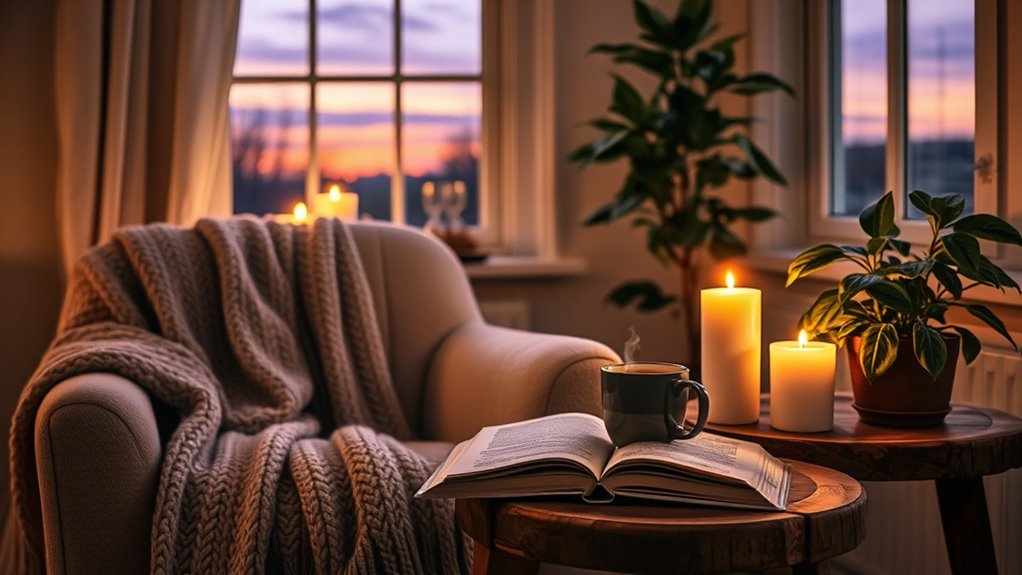Evening Routines That Will Change the Way You Unwind Forever!
Establishing intentional evening routines can greatly enhance your unwinding experience. Begin by creating a calming environment through dim lighting and soothing scents, which signal your body to relax. Incorporate mental preparation techniques like gratitude journaling and meditation to foster a positive mindset. Engage in gentle physical relaxation practices such as yoga or mindful breathing to release tension. Structuring your evening with specific relaxation activities promotes consistency and improves sleep hygiene. These elements collectively pave the way for profound relaxation and rejuvenation. Discover how to implement these strategies seamlessly into your evenings for a transformative experience.
Key Takeaways
- Dim the lights and incorporate soothing scents like lavender to create a calming atmosphere before bedtime.
- Engage in gratitude journaling to shift focus towards positivity and reduce stress levels effectively.
- Establish a consistent evening routine with specific relaxation activities to promote mental calmness and enhance sleep quality.
- Practice body scan meditation or yoga to connect with your body and release tension accumulated throughout the day.
- Optimize your sleep environment by keeping it cool, dark, and quiet for an uninterrupted night’s rest.
Creating a Relaxing Environment
Creating a relaxing environment is essential for unwinding at the end of the day, and implementing a few simple strategies can greatly enhance your nighttime routine.
Start by adjusting your home’s ambient lighting; opt for dimmer table lamps instead of harsh overhead lights. Amber light bulbs are particularly effective as they reduce blue light emission, promoting a more restful atmosphere. Dimming the lights an hour or two before bedtime can signal your body that it’s time to wind down.
Incorporating soothing scents into your space can further enhance relaxation. Consider using calming fragrances like lavender or cedarwood through essential oils or scented candles. A diffuser placed in your bedroom can disperse these aromas gently, creating a tranquil ambiance.
Additionally, keeping your bedroom tidy and organized contributes to a stress-free environment, while lower thermostat settings guarantee a comfortable temperature for sleep.
Lastly, complement this serene setting with calming sounds, such as nature sounds or soft music, to drown out any potential distractions.
Mental Preparation Techniques
Mental preparation techniques are essential for fostering a peaceful shift into sleep, promoting emotional well-being and reducing stress.
Practices such as gratitude journaling can enhance positive thinking, while effective meditation techniques help calm the mind and body.
Additionally, visualization exercises serve as powerful tools for relaxation, allowing individuals to mentally escape from daily pressures and embrace tranquility before bedtime.
Gratitude Journaling Benefits
Numerous studies highlight the profound benefits of gratitude journaling, particularly in fostering mental and emotional well-being. Engaging in gratitude techniques, such as daily reflections, can considerably reduce stress levels, enabling individuals to better cope with life’s challenges. By regularly acknowledging what one is thankful for, mood elevation and overall happiness are enhanced, creating a positive mental atmosphere.
Moreover, gratitude journaling can lead to improved sleep quality. By setting a positive tone before bedtime, it encourages a peaceful mindset conducive to rest. Additionally, this practice enhances self-awareness, as individuals reflect on what truly matters in their lives, cultivating a sense of optimism.
Gratitude journaling also strengthens relationships, as expressing appreciation deepens connections with others. Sharing gratitude can foster community and reinforce mutual support among friends and family.
To reap these benefits, consistency is key; establishing a routine for journaling and focusing on the specifics of what evokes gratitude can amplify its impact. Mindfulness in recognizing the small joys in everyday life further enriches this practice, making gratitude journaling a powerful tool for personal growth and emotional resilience.
Effective Meditation Practices
Establishing a calming evening routine not only enhances sleep quality but also provides an opportunity to incorporate effective meditation practices that can further promote relaxation and mental clarity.
One powerful technique is the body scan meditation, where you focus on different parts of your body, lingering on sensations and using deep breathing to maintain awareness. This practice can help ground you in the present moment, making it an ideal precursor to sleep.
Another engaging method is mindful walking. This involves walking at a natural pace while counting your steps, which helps maintain mental focus and increases awareness of your surroundings. This practice can be particularly soothing when performed outdoors.
Additionally, consider loving kindness meditation, where you cultivate positive feelings towards yourself and others. By silently reciting phrases like “May I live in safety,” you foster a sense of connection and warmth that can ease the mind.
Incorporating these meditation techniques into your evening routine can greatly enhance your ability to unwind, setting the stage for restful sleep and a refreshed mind.
Visualization for Relaxation
Harnessing the power of visualization can greatly enhance your ability to unwind and prepare for a restful night’s sleep. By engaging in this mental preparation technique, you can markedly reduce stress and anxiety, paving the way for a peaceful slumber. The key lies in employing vivid sensory engagement, allowing your mind to create calming imagery.
| Visualization Technique | Description |
|---|---|
| Imagination is Key | Focus on calming, restful images |
| All Senses Engagement | Incorporate sight, sound, smell, touch, and taste |
| Peaceful Settings | Visualize serene locations like beaches or mountains |
| Guided Scripts | Use structured exercises for relaxation |
| Consistent Routine | Regular practice enhances effectiveness |
The visualization benefits extend beyond mere relaxation; it actively reduces tension and encourages a positive mindset. By choosing familiar places that evoke tranquility, you can mentally transport yourself to these havens. Consider visualizing protective light surrounding you after a challenging day, or indulging in ocean sounds to create a serene escape. By incorporating visualization into your nightly routine, you signal your body that it’s time to unwind, enhancing overall well-being.
Physical Relaxation Methods
Incorporating physical relaxation methods into your evening routine can greatly enhance your overall sense of well-being.
Warm baths and yoga are two effective strategies that not only reduce stress but also promote a restful state in preparation for sleep.
Warm Bath Benefits
After a long day, immersing oneself in a warm bath can be a transformative experience that greatly benefits both physical and mental well-being.
The ideal bath temperature not only offers immediate comfort but also provides significant health benefits that can enhance your overall quality of life.
-
Improves Blood Circulation: The heat from the bath dilates blood vessels, promoting better blood flow and cardiovascular health.
-
Reduces Stress and Anxiety: Soaking in warm water calms the nervous system, effectively lowering stress levels and enhancing mood.
-
Enhances Sleep Quality: A warm bath before bedtime raises body temperature, and the subsequent cooling effect signals the body to produce melatonin, aiding sleep.
Yoga for Relaxation
Yoga offers a multitude of techniques specifically designed to promote relaxation, making it an excellent choice for unwinding after a hectic day. Incorporating mindful breathing and gentle flows into your evening routine can greatly enhance stress relief and foster a calm mind.
Utilizing yoga props can provide additional support during evening sequences, allowing for deeper body awareness. Poses such as Child’s Pose and Legs Up the Wall promote relaxation while preparing the body for restful sleep.
The benefits of Savasana, often referred to as the corpse pose, are profound; it allows for complete physical and mental release, enhancing the relaxation experience.
To further deepen your practice, consider integrating techniques like Yoga Nidra, which guides practitioners into a state of conscious relaxation. This approach can help activate the parasympathetic nervous system, facilitating a more profound sense of calm.
Regular practice of these relaxation techniques not only helps to dissipate daily stress but also cultivates an overall sense of well-being, setting the stage for a peaceful night’s rest.
Planning and Organization
When establishing an effective evening routine, careful planning and organization are essential for maximizing productivity and fostering a sense of calm. By utilizing task prioritization techniques, individuals can create a streamlined process that allows for a smoother shift into the evening.
-
Identify and prioritize tasks: Begin by compiling an all-encompassing list of evening tasks, focusing on the most essential activities first. This step helps to guarantee that critical chores are completed without overwhelming oneself.
-
Set a structured schedule: Allocate specific time slots for each task, estimating the duration of each activity. This method not only aids in time management but also minimizes the likelihood of procrastination.
-
Implement evening checklist strategies: Create a checklist that includes all planned tasks. This tool serves as a visual reminder to stay on track and provides a sense of accomplishment as items are checked off.
Personal Enjoyment Activities
Personal enjoyment activities play an essential role in winding down after a busy day, as they provide an opportunity to recharge both mentally and physically. Engaging in creative hobbies, such as painting, journaling, or playing a musical instrument, can offer a therapeutic escape from daily stresses.
These pursuits not only stimulate the mind but also foster a sense of accomplishment and joy.
Incorporating relaxation techniques into your evening routine is equally beneficial. Activities like warm baths with Epsom salts, gentle stretching, or listening to soothing music can help alleviate tension and promote tranquility.
Mindfulness practices, such as meditation or deep breathing, further enhance your ability to unwind.
Quality time with loved ones is another crucial aspect of personal enjoyment. Sharing meals and engaging in board games or puzzles can strengthen bonds and create lasting memories.
Additionally, outdoor activities like stargazing or leisurely walks allow for reflection while connecting with nature.
Enhancing Sleep Hygiene
Enhancing sleep hygiene is vital for achieving restorative rest and overall well-being. By adopting effective practices, you can improve both the quality and duration of your sleep. Here are three foundational strategies to contemplate:
-
Establish a Consistent Sleep Schedule: Go to bed and wake up at the same time every day, including weekends. This regularity helps regulate your body’s internal clock, making it easier to fall asleep and wake up refreshed.
-
Create a Relaxing Pre-Bed Routine: About 30-60 minutes before bedtime, begin winding down by unplugging from electronics and dimming the lights. Engage in calming activities such as reading or meditation, which can notably enhance your ability to relax.
-
Optimize Your Sleep Environment: Confirm your bedroom is conducive to sleep by maintaining a cool temperature (around 65-68°F), blocking out light, and minimizing noise. Think about using calming scents like lavender to foster relaxation.
Additionally, utilizing sleep tracking can help you identify patterns that affect your rest.
Be cautious with bedtime snacks; opt for light, healthy options that won’t disrupt your sleep.
Implementing these strategies can lead to notably improved sleep hygiene.
Frequently Asked Questions
How Long Should My Evening Routine Typically Last?
The ideal duration for an evening routine typically ranges from 30 minutes to a couple of hours, allowing for routine flexibility. Focus on enjoyable activities that promote relaxation and signal your brain to prepare for sleep.
Can I Combine Activities From Different Categories?
Yes, activity blending is highly beneficial. Routine customization allows for the integration of diverse activities, enhancing both relaxation and engagement. This tailored approach fosters a more fulfilling experience, accommodating individual preferences and promoting overall well-being.
What if I Can’t Fall Asleep After My Routine?
When sleep eludes you despite your routine, consider employing relaxation techniques such as deep breathing or journaling. Additionally, implementing sleep tips like getting up briefly can foster a calmer mindset conducive to rest.
How Do I Know if My Routine Is Effective?
To evaluate your routine effectiveness, conduct a routine assessment by monitoring sleep quality, energy levels, and overall well-being. Adjust activities based on these observations, ensuring they promote relaxation and consistency for ideal results.
Are There Specific Foods to Avoid at Night?
Maneuvering through the culinary landscape of late-night snacks requires caution; certain foods can sabotage sleep hygiene. Avoid high-fat, spicy, and sugary options to foster restful sleep, ensuring your evenings are serene and rejuvenating.
Conclusion
Incorporating evening routines transforms the winding down process into a serene symphony of relaxation and rejuvenation. By cultivating a tranquil atmosphere, engaging in mental and physical relaxation techniques, and prioritizing personal enjoyment, individuals can navigate the shift from day to night with grace. Enhanced sleep hygiene serves as the final brushstroke in this masterpiece of unwinding, ensuring that restful slumber becomes a nightly companion. Embracing these practices will illuminate the path toward a more peaceful and restorative evening experience.



